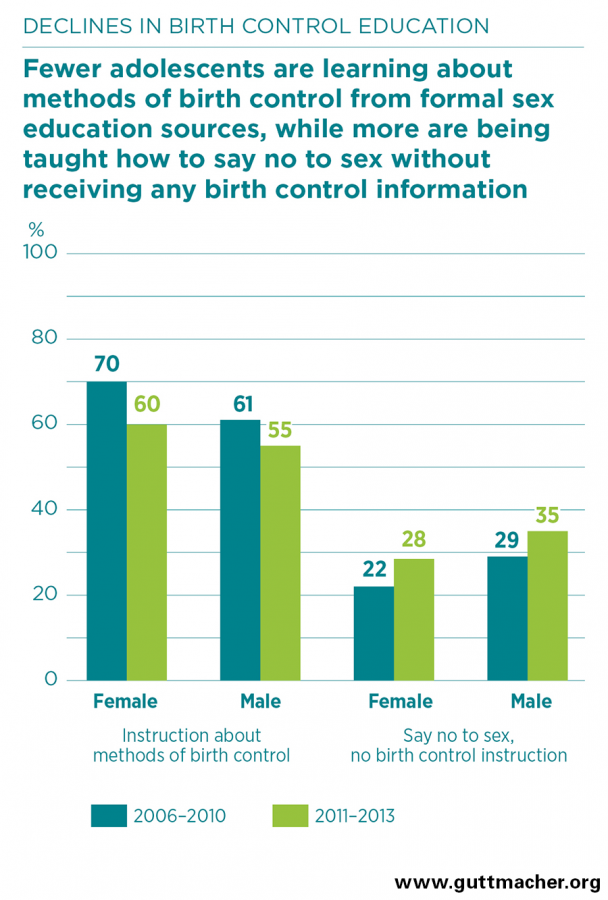Poor sex education curriculum in America affects young adults
Sex education is introduced to students around middle school ages. It can be a very touchy and uncomfortable topic for many, but it’s extremely important for young adults to be informed of their bodies and the different types of experiences to prepare for.
Although schools favor teaching abstinence over contraceptives, which is good, this isn’t beneficial for students. Preaching about abstinence provides people with a good way of maintaining health and diminishing the risk of getting pregnant or catching some sort of STD. It is extremely unrealistic for all people to practice abstinence, therefore schools should stress safe sex before abstinence. This will give students options and a better outlook at sex and how to protect their bodies.
More students should be informed in birth control, body anatomy of all genders, contraceptive options for all sexual orientations, reproductive systems, and practicing safe sex to avoid STD’s. This needs to be taught more openly for all kinds of people to be included in the conversation.
However, teaching sex education to youth can be a difficult task. It can be hard to make sure they comprehend all the information about their bodies, their reproductive systems, and conception. It is important they do know because if they do not, they’ll grow up to be adults who learn the hard way and end up having unwanted and unplanned pregnancies like many people are currently doing.
According to the Washington Post, 45 percent of the millions of pregnancies each year are unplanned, which is due to the fact that abstinence is favored in sex education. While in reality, people will continue to have sex, so preaching about abstinence is a very impractical way of avoiding future unplanned pregnancies or unwanted STDs.
Additionally, the LGBTQ+ has very little to no representation when it comes to sex education. Most of the curriculum caters to only heterosexual sex and the kinds of contraception for that. There is no inclusion for people of other sexual orientations. There is a lack of important information about the kind of contraceptives they’ll need, which later ends up affecting them.
“A recent policy review revealed that only 22 states include topics related to LGBTQ+ students,” says Caroline Eppright from the Maudern.
This goes to show that schools are deliberately excluding people of the LGBTQ+ community from a proper education on sex and human anatomy. They are being left out of the conversation yet again. Inclusion is so important to preserve the health of young people and ensure everyone is getting equal access to education.
There are some schools that also decide to opt out of sex education and would rather not introduce that topic to young adults. This continues to push the idea that sex, human bodies, anatomy and reproductive systems are some sort of taboo that shouldn’t be talked about, but it should be. It’s normal and it is a part of human nature, therefore it must be addressed. This causes people to be unaware of contraceptives and understanding one another’s bodies.
This isn’t new either, people of older generations have a hard time understanding the concepts of sex and human bodies because they weren’t taught enough about it or just weren’t taught at all.
Fifty-eight-year-old Dorys Chaves says, “It was completely taboo, there was no kind of education really when it came to sex.”
Avoiding the topic of sex education is not going to help anyone in the long run. It’s only withholding people’s knowledge of their bodies and setting them up for mishaps along the way. Not talking about sex and only preaching abstinence is not going to keep people from having sex. It’s only going to bring about more curiosity and uncertainty.
Your donation will support the student journalists of Parkdale High School. Your contribution will allow us to cover our annual website hosting costs and publish some printed editions, as well.

Andrea Ulloa is a junior at Parkdale, and this is her first year on staff. She loves being a part of The Paw Print because it has given her a creative...








Anonymous • Dec 16, 2021 at 9:22 am
As an LGBT student at parkdale, the way they only taught us about heterosexual sex left me with no knowledge on how I can actually have safe sex. They didn’t teach us about transgender anatomy either, which is a really big problem for me. Parkdale needs to open up about how they’re gonna make it a better place for all LGBTQ+ students. We need a curriculum on certain sexualities too.
Lacey • Nov 16, 2021 at 8:10 am
I agree that teaching about safe sex is extremely important because the age to where kids are experiencing is dropping and more and more student re being exposed to STD´s because of ignorance to the subject. i feel that it should be put in every health curriculum from the start of middle school.